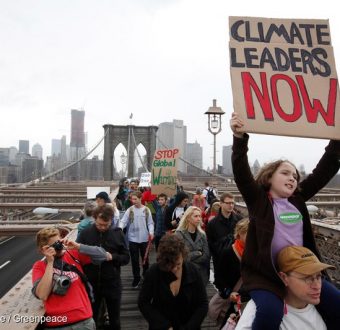It’s been a great week for the movement calling out Exxon’s colossal climate denial operation, but the world’s largest private oil company isn’t having as much fun.
First, the Rockefeller Family Fund (RFF) announced it would divest from fossil fuels, and specifically from Exxon. Then, the Securities and Exchange Commission (SEC) ruled against the corporation, siding with Exxon’s shareholders. Finally, two more U.S. attorneys general announced they were opening their own investigations into Exxon’s climate denial, and it looks like a lot of others are close to doing the same.
The Terrible, Morally Reprehensible Conduct Leading to Divestment
On March 23, RFF announced it would divest from all fossil fuels. Going even further, it instructed its advisors to “immediately … eliminate [its] holdings of ExxonMobil.” Why? Because of Exxon’s “morally reprehensible conduct.”
Let that sink in for a minute.
The heirs of John D. Rockefeller, the founder of Exxon and really, the modern oil industry, decided that Exxon’s climate denial was so egregious that they couldn’t keep their money in the company any longer. And rather than quietly divesting, they released a statement explaining exactly why they were doing it. RFF’s decision on Exxon signals that the fossil fuel era is at its end, and we are moving towards a future powered by renewables.
The Horrible, Zero Transparency Attitude Towards Its Own Shareholders
Later that same day, the SEC (which has been criticized for its weak climate-related disclosure guidance) stunned the financial community by ruling against Exxon.
For years, Exxon had beat back shareholder proposals asking it to disclose business plans to adapt to a world that limits emissions. Instead, Exxon denied that world would ever exist. This year, however, the SEC not only decided that Exxon’s investors could vote to ask Exxon for those plans, they also held that investors could vote on the moral imperative of keeping climate change to two degrees.
That world means fossil fuels stay in the ground. That world means the fossil fuel industry has to acknowledge climate change is happening and that emissions are causing it.
The Very Bad Climate Denial Operation Faces Legal Investigations
On March 29, business-as-usual for Exxon and the fossil fuel industry took another blow, when 17 attorneys general announced, with an assist from Al Gore, that they were teaming up to take action on climate change. For Massachusetts and the U.S. Virgin Islands, that meant confirming that they are investigating whether Exxon’s colossal climate denial operation broke laws.
The two officials join their counterparts in New York and California, who started their own probes earlier. New York’s attorney general Eric Schneiderman criticized the “morally vacant forces” contributing to climate denial, and called out the fossil fuel industry for “putting profits over needs of the American people and the integrity of financial markets.”
The fossil fuel industry took it on the chin this week, from denial to divestment. Exxon now faces investigations by four U.S. attorneys general in total — a situation that is starting to look a lot like the legal cases that took down Big Tobacco for lying about the link between smoking and cancer. Climate denialism fed fossil fuel industry profits for years, but that isn’t the world we live in anymore.
Fossil fuel companies will be held to account for climate change, to investors, to public officials, and to the world.




